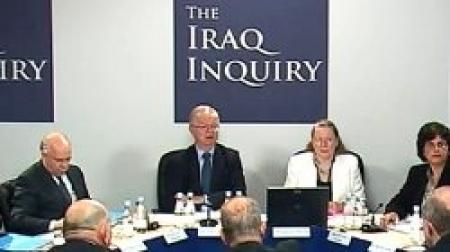ID :
93787
Tue, 12/08/2009 - 16:13
Auther :
Shortlink :
http://m.oananews.org//node/93787
The shortlink copeid
Sen. UK Official: I warned Blair to delay 2003 Iraqi invasion

London, Dec 8, IRNA – A senior British officer revealed Monday how he urged former prime minister Tony Blair to delay the 2003 invasion of Iraq because preparations for dealing with the aftermath were not in place.
Major General Tim Cross said he spent about 30 minutes with Blair on March 18, 2003, three days before the invasion, trying to convince him that the preparations were “woefully thin.”
“I was as honest about the positions as I could be, essentially briefing that I did not believe post-war planning was anywhere near ready," said Cross, who was attached to the Office for Reconstruction and Humanitarian Assistance (Orha) set up by the US to manage the aftermath.
"I told him that there was no clarity on what was going to be needed after the military phase of the operation, nor who would provide it,” he said in giving evidence to the Iraq War Inquiry in London.
"Although I was confident that we would secure a military victory, I offered my view that we should not begin that campaign until we had a much more coherent post-war plan," the major general said.
Last week, former UK chief of the defense staff, Admiral Lord Boyce, told the inquiry that he and other top British officers found it "very frustrating" that they could not carry out logistical plans for the invasion because of fears that the public would assume the war was inevitable.
Boyce revealed that he had not been permitted to make purchases or carry out other practical planning for deployment to Iraq before November 2002, just four months before the British troops joined the invasion.
Cross also criticized the then-international development secretary, Clare Short, who subsequently resigned over the war, saying she would not allow one of her officials to work with him on a full-time basis because of her "well known concerns".
"This was, I am bound to say, unhelpful for me, and it was an early indicator that Whitehall was not much more joined up than Washington," he said.
Cross also said there was “a strong reluctance” to formally support Orha. “We did have Dfid [Department for International Development] representation, but it was nowhere near sufficient to meet our needs," he said.
"Considering the expected scale of the humanitarian suffering, the projected numbers of [refugees], civilian casualties etc this was, once again, more than a little disappointing."/end
Major General Tim Cross said he spent about 30 minutes with Blair on March 18, 2003, three days before the invasion, trying to convince him that the preparations were “woefully thin.”
“I was as honest about the positions as I could be, essentially briefing that I did not believe post-war planning was anywhere near ready," said Cross, who was attached to the Office for Reconstruction and Humanitarian Assistance (Orha) set up by the US to manage the aftermath.
"I told him that there was no clarity on what was going to be needed after the military phase of the operation, nor who would provide it,” he said in giving evidence to the Iraq War Inquiry in London.
"Although I was confident that we would secure a military victory, I offered my view that we should not begin that campaign until we had a much more coherent post-war plan," the major general said.
Last week, former UK chief of the defense staff, Admiral Lord Boyce, told the inquiry that he and other top British officers found it "very frustrating" that they could not carry out logistical plans for the invasion because of fears that the public would assume the war was inevitable.
Boyce revealed that he had not been permitted to make purchases or carry out other practical planning for deployment to Iraq before November 2002, just four months before the British troops joined the invasion.
Cross also criticized the then-international development secretary, Clare Short, who subsequently resigned over the war, saying she would not allow one of her officials to work with him on a full-time basis because of her "well known concerns".
"This was, I am bound to say, unhelpful for me, and it was an early indicator that Whitehall was not much more joined up than Washington," he said.
Cross also said there was “a strong reluctance” to formally support Orha. “We did have Dfid [Department for International Development] representation, but it was nowhere near sufficient to meet our needs," he said.
"Considering the expected scale of the humanitarian suffering, the projected numbers of [refugees], civilian casualties etc this was, once again, more than a little disappointing."/end





